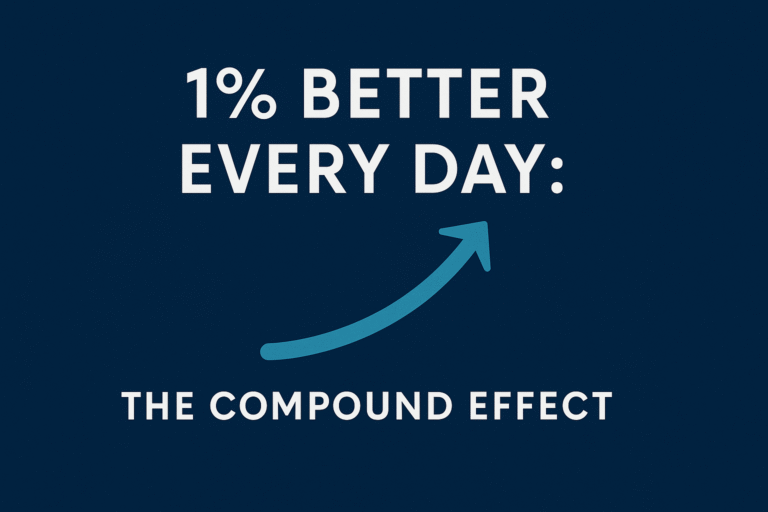Introduction
What if success wasn’t a matter of luck but a predictable outcome of specific habits and actions? The truth is, high achievers don’t just stumble into success—they follow a success formula that makes winning inevitable. Whether in business, personal growth, or finances, the key is not just working hard but working smart with a structured approach.
According to James Clear in Atomic Habits, success is not about massive actions but rather the compounding effect of small, consistent habits. I’ve seen this firsthand. When I was starting out, I thought success was about grinding non-stop. I put in long hours but got minimal results. It wasn’t until I started studying how top performers operate that I realized success follows a system. Once I implemented that system, everything changed. In this article, we’ll break down the formula that can help you create unstoppable momentum toward your goals.
1. Clarity: Defining What Success Looks Like for You
Success Starts with a Clear Target
Most people struggle because they don’t define what success means to them. Saying “I want to be successful” is vague. Success needs specifics. What does success in your life look like? Is success being productive all the time? Making a lot of money? If so, how much per month or total dollar amount? Is it doing what you love for a living? Going on vacation whenever you want?
Think about it: If you don’t define the destination, how can you plan the route?
Instead of saying, “I want to make a lot of money,” try: “I will earn $100,000 in the next 12 months by launching a marketing agency.” Or instead of saying, “I want to be a millionaire,” reframe with, “I will earn a net worth of 1 million dollars by owning assets that earn x amount of dollars per year or are worth that amount, or I have saved $1 million in cash, savings, or in retirement.” Then, go into specifics of how much is in each.
Reverse Engineering Your Goals
Once you define success, work backward to create an action plan:
- Break it down into quarterly, monthly, and weekly milestones.
- Identify the daily actions required to reach those goals.
- Track progress and adjust as needed.
Success isn’t a single leap—it’s a series of small, consistent steps. Having a big vision but executing small goals to get there.
2. The Right Mindset: Thinking Like a Winner
Success begins in your mind. Carol S. Dweck in Mindset: The New Psychology of Success, emphasizes the power of a growth mindset, which allows you to embrace challenges, persist through difficulties, and view failure as a stepping stone.
- Reframe Failure: Instead of seeing setbacks as dead ends, see them as lessons that bring you closer to success.
- Visualize Success: Olympic athletes use visualization techniques to rehearse success before it happens. The same applies to business, fitness, or personal goals.
- Affirmations & Self-Talk: High performers eliminate self-doubt by speaking to themselves in empowering ways.
The Growth vs. Fixed Mindset
Your mindset dictates your results. People with a fixed mindset believe their abilities are set in stone, while those with a growth mindset see challenges as opportunities to learn.
Example: Michael Jordan was cut from his high school basketball team. Instead of giving up, he doubled down on practice and became one of the greatest athletes of all time.
Eliminating Self-Sabotage
Most people fail not because they lack skills but because they let self-doubt hold them back. Even having a little self-belief can make all the difference. Replace negative thoughts like “I’m not good enough” with “I can learn whatever I need to succeed.”
3. Relentless Execution: Taking Consistent Action
Why Most People Fail: The Motivation Trap
Waiting for motivation is a mistake. Motivation is temporary. Discipline is what keeps you going.
- Instead of relying on “feeling motivated,” create systems that force action.
- Schedule non-negotiable work blocks.
- Track progress to stay accountable.
Building Non-Negotiable Success Habits
Your habits determine your future. As James Clear explains, “You do not rise to the level of your goals. You fall to the level of your systems.” This means creating a daily structure that fosters success. The most successful people don’t rely on willpower; they build strong habits that make winning easy, like:
- Reading and learning daily.
- Networking and connecting with mentors.
- Exercising and maintaining physical health.
- Waking up early to plan the day.
Success is built in the small, consistent actions you take daily. Having strong habits is 80% of all the winning.
4. Strategic Adaptation: Learning from Failures
Why Failure Is Part of the Formula
Most people see failure as a sign to quit. Successful people see it as feedback. Reframing failure is key since, on the way to success, failure is very common. No one who achieves anything great has ever got there without making mistakes or without having immense failures. They are no different than any of us, they just used failure as feedback to try something different and kept going.
Example: Elon Musk’s first three SpaceX rocket launches failed. Instead of giving up, he analyzed what went wrong and improved. The fourth attempt was a success.
The Importance of Mentors and Feedback Loops
The fastest way to improve is to learn from those who’ve already succeeded. Seek out mentors who can guide you and provide constructive feedback. You become the people you hang around with. If you are curious about the path forward, ask someone who is already coming back.
5. Optimizing Your Life for Success
Designing an Environment That Supports Your Goals
Set your work environment up for success where productivity is inevitable. Your surroundings shape your habits. If you want to focus, eliminate distractions:
- Set up a dedicated workspace.
- Keep your phone on silent during deep work.
- Make it non-negotiable to get work done.
- Surround yourself with ambitious, like-minded people.
Mastering Time Management
High performers don’t work harder; they work smarter. Use prioritization techniques like:
- The 80/20 Rule: 80% of results come from 20% of efforts—focus on the highest-impact activities.
- Eisenhower Matrix: Prioritize urgent vs. important tasks.
- Just because you are doing a lot more doesn’t mean you’re getting anything done.
Energy and Performance Optimization
Success isn’t just about time management—it’s also about energy management. Just because we carve the time to do important things doesn’t mean we have the energy to want to do them. Having a lot of energy gives you the winning edge. Simple energy optimizations include:
- Prioritizing sleep, exercise, and nutrition.
- Using time-blocking to schedule breaks for peak performance.
- Focusing on unplugging and winding down after work.
- Learning to be present and taking short vacations.
Developing a Winning Routine
Morning and evening routines set the tone for success.
- Start the day with goal-setting and affirmations.
- End the day with reflection and planning for tomorrow.
6. Leveraging Opportunity: Recognizing and Capitalizing on the Right Moves
Why Luck is Just Preparation Meeting Opportunity
The most successful people don’t just “get lucky”—they create opportunities by constantly putting themselves in the right environments ripe with opportunity and taking action. But also taking calculated risks.
Example: Jeff Bezos left a stable Wall Street job because he saw the opportunity in e-commerce. He took a calculated risk, and Amazon became a global giant.
Surrounding Yourself with the Right People
Your network determines your net worth. If you want to succeed, build relationships with ambitious, driven people who push you to be better. This success formula will not work unless you have an environment that aligns with and supports your goals and vision. The key is the right environment! If you put yourself in an environment that makes winning easy, then that will be the result.
Conclusion: Success Is Inevitable When You Follow the Formula
Success isn’t magic. It’s a repeatable success formula that includes clarity, mindset, execution, adaptation, optimization, and leveraging opportunities.
If you apply this formula consistently, winning won’t just be possible—it will be inevitable. Even applying a couple of things from this formula can make huge rippling effects.
What’s one step you can take today to start applying this formula in your life?
References
- Clear, James. Atomic Habits: An Easy & Proven Way to Build Good Habits & Break Bad Ones. Penguin, 2018.
- Covey, Stephen R. The 7 Habits of Highly Effective People: Powerful Lessons in Personal Change. Free Press, 1989.
- Dweck, Carol S. Mindset: The New Psychology of Success. Random House, 2006.
- Ferriss, Tim. The 4-Hour Workweek: Escape 9-5, Live Anywhere, and Join the New Rich. Harmony, 2007.
- Olson, Jeff. The Slight Edge: Turning Simple Disciplines into Massive Success and Happiness. Greenleaf Book Group, 2013.





